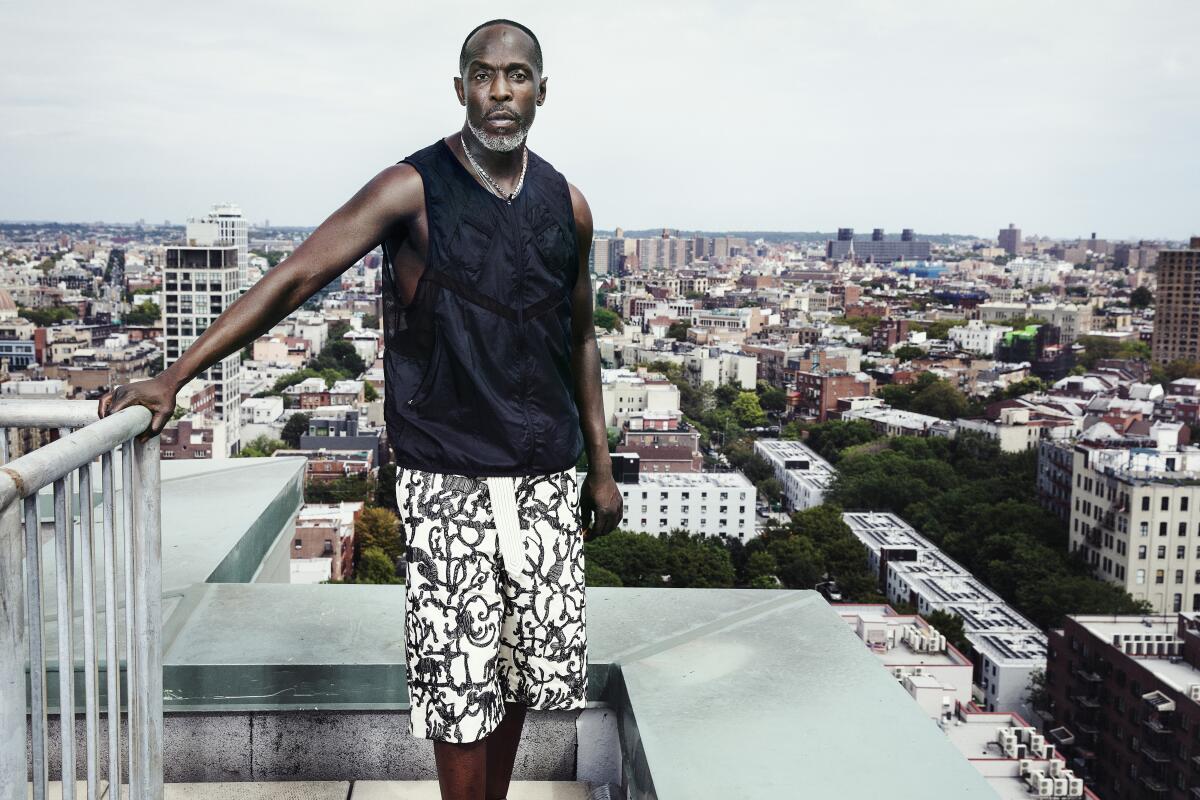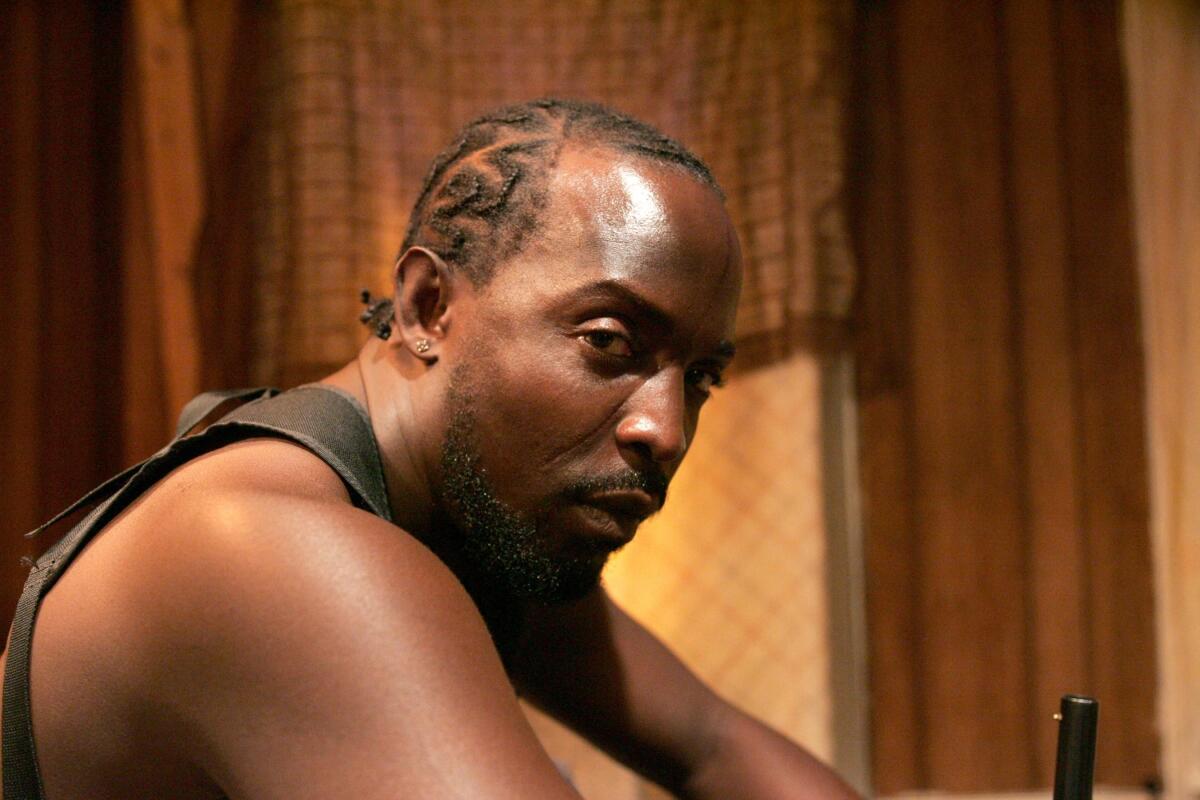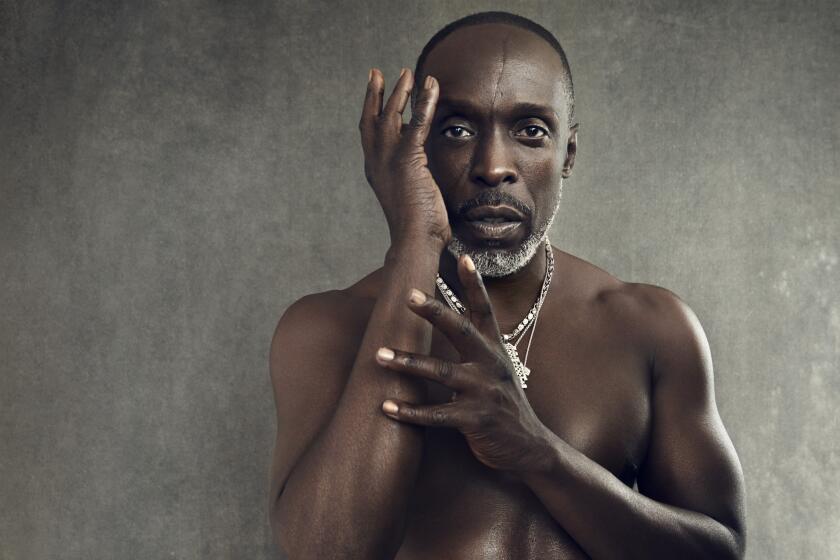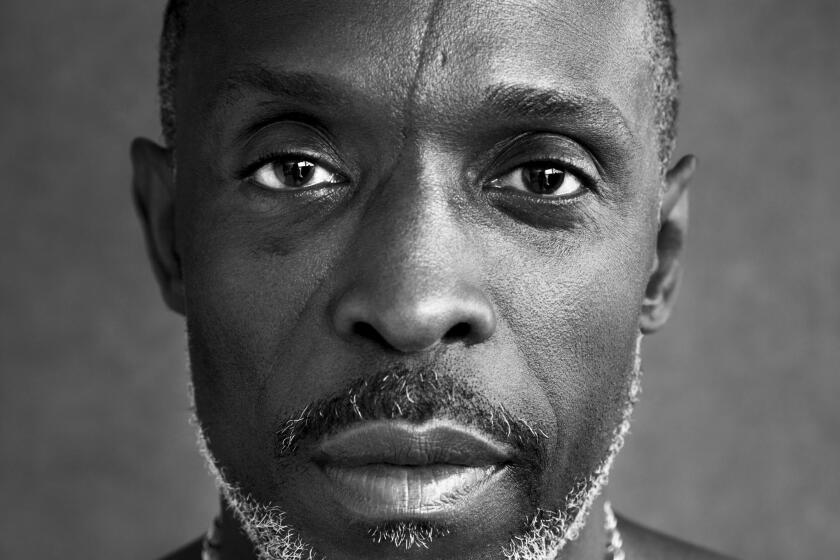Appreciation: Michael K. Williams never shied away from his demons: He acted with ‘100% honesty’

- Share via
The first time I encountered Michael K. Williams, I was almost too nervous to breathe.
The occasion was a tribute to “The Wire” at the Academy of Television Arts & Sciences, sometime around the series’ third season. At that time, the HBO drama had not yet attained the degree of acclaim or viewer interest that would later establish it as one of TV’s most outstanding series of all time, and a defining part of the medium’s most recent Golden Age. Although creator and executive producer David Simon and most of the cast were in attendance, the large auditorium was less than half full.
But those of us in the audience knew we were in the presence of something remarkable. Early fans knew “The Wire” was more than just a crime drama about drug dealers and cops in modern-day Baltimore. It was a kaleidoscopic depiction of a penetrating reality — the struggle of young Black men and women in often overwhelming situations — filled with complex, flawed characters who anchored the drama in truth and authenticity.
Just being in the same room as “The Wire’s” magnificent ensemble was electric, but my heart really leapt when I was invited to come onstage and chat with them at the end of the evening. Although the actors were approachable and polite, I needed to summon up the courage to speak to Williams, who died Monday at 54. His portrayal of the sinister, violent gangster Omar Little was so convincing it was hard at that moment to separate the character from the performer.
Michael K. Williams, known for “The Wire” and “Boardwalk Empire,” was a sentimental Emmy favorite for his work on HBO’s “Lovecraft Country.”
With a cobra-like grin, a gravel-hard voice and an ominous scar near his eye, Williams’ Little was street terror personified. Toting a sawed-off shotgun and casually whistling “A-Hunting We Will Go” as he roamed the streets, Little was so lethal that children would cry out the warning “Omar comin’!” upon his approach, sending anyone within earshot — even outlaws — to run and hide in fear.
Williams’ portrayal of a gay antihero with a Robin Hood-like moral code shattered boundaries. And like any formidable antagonist, he possessed an infectious charisma — Omar knew he was the king of the neighborhood, and his deadly wrath made all who crossed his path quiver. He took delight in the dread he provoked but also had an innocent’s love for Honey Nut Cheerios (“Honey Nut, yo!”).

Words did not come easy when I finally worked up the nerve to speak to Williams, but I was instantly disarmed and impressed by his low-key grace and warmth. He was humbled by my praise of his work, and he could not have been kinder or more respectful. It was the beginning of a relationship that always made me feel honored to be in his company.
When we had our first formal interview at the Chateau Marmont several years later, in 2010, his role as ruthless businessman Chalky White in HBO’s “Boardwalk Empire” had added to “The Wire” and many other projects to establish him as a force to be reckoned with. Williams was obviously pleased by the looks and waves of recognition from diners as he walked to our table at the hotel’s outdoor restaurant.
He was just as gracious as he had been when we first met. But during our conversation, it became clear that he was still haunted by his early years as a struggling young actor trying to make his mark in music videos and TV guest spots. At one point, he recalled being so filled with despair that he felt, he said, like “part of me was dead inside.”
In a low voice, he said, “I was in a lot of pain — drugs, alcohol, 9/11. I wound up working at my mother’s day-care center in Brooklyn. I was coming from a dark place personally when I read for Omar. And when I read it, I knew I could put that part of myself into that part.”
He called upon those painful memories again when he portrayed White and other demanding roles: “I love my characters. I play them with 100% honesty; there’s no holding back. I understand where they are coming from.”
But although “The Wire” put Williams on the path to stardom, he later admitted that the role of Omar brought him even more anguish.
Said Williams: “The darkness of the character weighed on my psyche so much that when the show ended, I was completely unequipped [to cope with that darkness]. I was hurting myself in every possible way you could imagine.
“And it wasn’t always about doing drugs; it was negative company, negative places. I was dark-minded, bad decisions one after another. But someone was looking out for me because I never stopped working.”
When we met again in 2016, Williams seemed to be everywhere. He was costarring as a prison powerbroker in HBO’s “The Night of” — a role that would earn him one of five Emmy nominations — playing gay activist Ken Jones in ABC’s miniseries “When We Rise,” and producing and hosting a project for Vice, “Black Market With Michael K. Williams.”
The beloved star of “The Wire” and “Lovecraft Country” graciously sat for portraits revealing the range of emotion — and the honesty — fans loved.
What stood out during that interview — which would turn out to be our last talk — was how Williams truly seemed as if he had put his pain behind him. He was in fine spirits, using his personal iPhone playlist of tunes by Swedish singer Snoh Aalegra for a pre-interview photo shoot. “I just love this,” he said of the catchy R&B-flavored groove as he posed.
Finally settling down for lunch on the rooftop restaurant of the London West Hollywood Hotel, he beamed when I asked him how he was.
“I am blessed,” he declared. “I feel truly blessed today.”
He exhibited a spiritual calm, detailing how he was trying to take better care of himself, “aiming for a better Michael, a more secure and comfortable Michael. It’s within reach.”
As we parted ways, we embraced.
I never stopped being awed by Michael’s incredible talent, magnetism and strength, both as an artist and as a person. Remembering our last embrace helps a little to soothe my heartbreak over his loss.
More to Read
The complete guide to home viewing
Get Screen Gab for everything about the TV shows and streaming movies everyone’s talking about.
You may occasionally receive promotional content from the Los Angeles Times.









